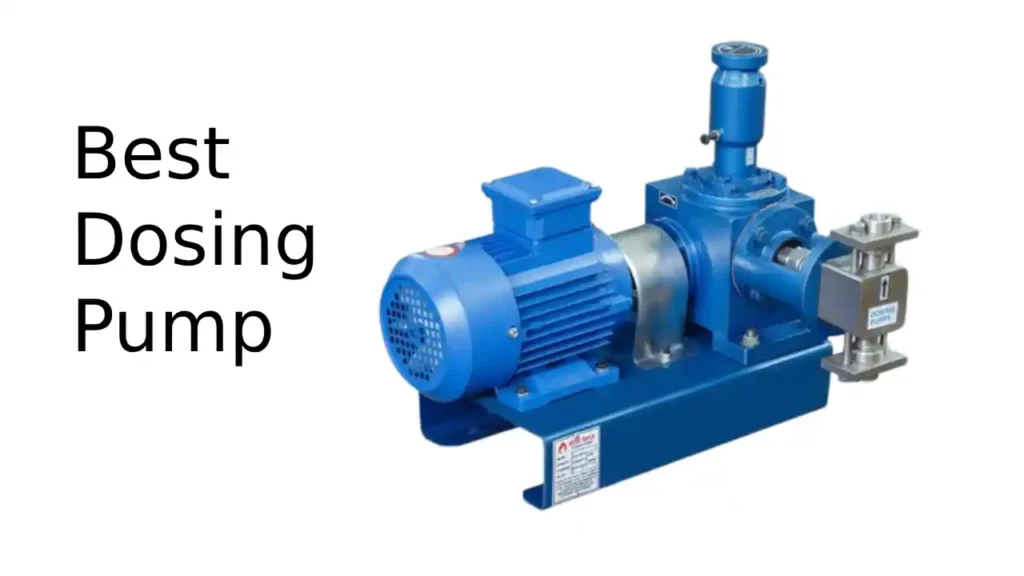Dosing pumps play a pivotal role in various industries where accurate and controlled dosing of fluids is crucial. From water treatment facilities to chemical processing plants, dosing pumps ensure precise delivery of chemicals, additives, or other liquids into a system. In this article, we’ll delve into the world of dosing pumps, exploring their types, advantages, applications, and best practices for maintenance.
Understanding Best Dosing Pumps
Dosing pumps accurately dispense fluids at predetermined flow rates, catering to industries where precise dosing maintains process efficiency and product quality.. The primary components of a dosing pump include a pump head, drive mechanism, and control system.
Types of Best Dosing Pumps
There are several types of dosing pumps available, each offering unique advantages depending on the application requirements:
- Piston Pumps: Utilize reciprocating pistons to displace fluid, offering high precision and reliability.
- Diaphragm Pumps: Operate by flexing a diaphragm to push fluid through the pump, suitable for corrosive or abrasive fluids.
- Peristaltic Pumps: Feature rotating rollers that compress flexible tubing, providing gentle and accurate fluid dosing without contamination.
- Gear Pumps: Employ interlocking gears to pump fluid, ideal for high pressure applications and viscous fluids.
Advantages of Best Dosing Pumps
Dosing pumps offer several benefits over traditional dosing methods:
Accuracy in Chemical Dosing: Dosing pumps ensure precise delivery of chemicals, minimizing waste and ensuring consistent results.
Efficient and Reliable Operation: With minimal maintenance requirements, dosing pumps offer reliable performance even in demanding environments.
Applications of Best Dosing Pumps
Dosing pumps find widespread use across various industries, including:
Water Treatment Plants: Used for chemical disinfection, pH adjustment, and flocculation.
Chemical Processing Industries: Employed for precise dosing of additives, catalysts, and reagents.
Pharmaceuticals: Essential for drug manufacturing processes requiring precise ingredient dosing.
Factors to Consider When Choosing a Best Dosing Pump
When selecting a dosing pump for a specific application, it’s essential to consider:
Flow Rate Requirements: Ensure the pump can deliver the required volume of fluid within the specified timeframe.
Chemical Compatibility: Verify that the pump materials are compatible with the fluids being dosed to prevent corrosion or contamination.
Maintenance and Serviceability: Choose a pump with accessible components for easy maintenance and repair.
Best Practices for Dosing Pump Maintenance
To ensure optimal performance and longevity of dosing pumps, follow these maintenance practices:
Regular Inspection and Cleaning: Periodically inspect the pump for wear, corrosion, or blockages, and clean or replace components as needed. Lubrication of Moving Parts: Apply lubricants to bearings, seals, and other moving parts to reduce friction and prevent premature wear.
Conclusion
Best Dosing pumps are indispensable tools in industries where precise fluid dosing is critical for operational efficiency and product quality. Understanding the types, advantages, and applications of dosing pumps, along with proper maintenance practices, is essential for maximizing their effectiveness and longevity.
FAQs
- What are dosing pumps used for?
Dosing pumps are used to accurately dispense fluids in various industries, including water treatment, chemical processing, and pharmaceuticals.
- How do dosing pumps work?
Dosing pumps operate by displacing fluid at a controlled rate using mechanisms such as pistons, diaphragms, or peristaltic action.
- What factors should be considered when selecting a dosing pump?
Flow rate requirements, chemical compatibility, and maintenance considerations are key factors to consider when choosing a dosing pump.
- Are dosing pumps easy to maintain?
With proper care and maintenance, dosing pumps can offer reliable performance and longevity.
- Can dosing pumps handle corrosive fluids?
Yes, certain types of dosing pumps, such as diaphragm pumps, are designed to handle corrosive or abrasive fluids effectively.

